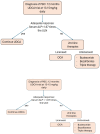Up-to-Date Snapshot of Current and Emerging Medical Therapies in Primary Biliary Cholangitis
- PMID: 39728045
- PMCID: PMC11678846
- DOI: 10.3390/jpm14121133
Up-to-Date Snapshot of Current and Emerging Medical Therapies in Primary Biliary Cholangitis
Abstract
Background/Objectives: Primary biliary cholangitis (PBC) is an autoimmune chronic cholestatic disease of the liver that symptomatically can present with pruritus and fatigue. Its established first- and second-line therapies are ursodeoxycholic acid (UDCA) and obeticholic acid (OCA) although they provide limited symptom management. Liver transplantation offers a potentially curative therapeutic option in refractory cases progressing to cirrhosis. Novel research published after the current guidelines highlights the importance of providing an up-to-date analysis of treatment options available. Methods: In this study, we conducted a literature search using Pubmed, Ovid Medline, and SCOPUS to provide a narrative review of first-line, second-line, and emerging therapies in PBC. Results: UDCA has been well established as a long-term, safe therapy within the literature although it is possible that treatment dosage can be further optimised in refractory patients. It has a favourable side effect profile. Despite improving biochemical markers, histopathological profile, and overall outcomes, up to 30-40% of patients are refractory to it. Age and sex are highlighted as independent indicators of non-responsiveness. This necessitates effective second-line therapies. Future trials could aim to investigate UDCA as a co-first-line therapy. Further supporting results for OCA were found in the interim extension trial of the seminal POISE study. The long-term phase 4 COBOLT trial is still awaiting results to further assess the complications, adherence, and potential adverse effects. It is a viable option in UDCA-refractory patients. The high incidence rate of dose-related pruritis indicates that alternative second-line options are needed. Bezafibrate is an off-label antilipemic agent that shows promise as a prospective second-line therapy option. The landmark BEZURSO trial alleviated some efficacy and safety concerns, but it remains associated with elevated serum creatinine; thus, it should be considered with caution. Other prospective second-line therapies are budesonide, triple therapy, and novel agents such as seladelpar and elafibranor. Conclusions: UDCA should remain the treatment of choice for PBC, though perhaps not as monotherapy. With further investigation, BF shows promise as a new second-line therapy alongside OCA, which it may outperform.
Keywords: PBC; bezafibrate; fenofibrate; obeticholic acid; primary biliary cholangitis; primary biliary cirrhosis; ursodeoxycholic acid.
Conflict of interest statement
The authors declare no conflicts of interest.
Figures
Similar articles
-
Depressing time: Waiting, melancholia, and the psychoanalytic practice of care.In: Kirtsoglou E, Simpson B, editors. The Time of Anthropology: Studies of Contemporary Chronopolitics. Abingdon: Routledge; 2020. Chapter 5. In: Kirtsoglou E, Simpson B, editors. The Time of Anthropology: Studies of Contemporary Chronopolitics. Abingdon: Routledge; 2020. Chapter 5. PMID: 36137063 Free Books & Documents. Review.
-
Defining the optimum strategy for identifying adults and children with coeliac disease: systematic review and economic modelling.Health Technol Assess. 2022 Oct;26(44):1-310. doi: 10.3310/ZUCE8371. Health Technol Assess. 2022. PMID: 36321689 Free PMC article.
-
Abrocitinib, tralokinumab and upadacitinib for treating moderate-to-severe atopic dermatitis.Health Technol Assess. 2024 Jan;28(4):1-113. doi: 10.3310/LEXB9006. Health Technol Assess. 2024. PMID: 38343072 Free PMC article.
-
Far Posterior Approach for Rib Fracture Fixation: Surgical Technique and Tips.JBJS Essent Surg Tech. 2024 Dec 6;14(4):e23.00094. doi: 10.2106/JBJS.ST.23.00094. eCollection 2024 Oct-Dec. JBJS Essent Surg Tech. 2024. PMID: 39650795 Free PMC article.
-
The effectiveness of abstinence-based and harm reduction-based interventions in reducing problematic substance use in adults who are experiencing homelessness in high income countries: A systematic review and meta-analysis: A systematic review.Campbell Syst Rev. 2024 Apr 21;20(2):e1396. doi: 10.1002/cl2.1396. eCollection 2024 Jun. Campbell Syst Rev. 2024. PMID: 38645303 Free PMC article. Review.
References
Publication types
Grants and funding
LinkOut - more resources
Full Text Sources
Miscellaneous


